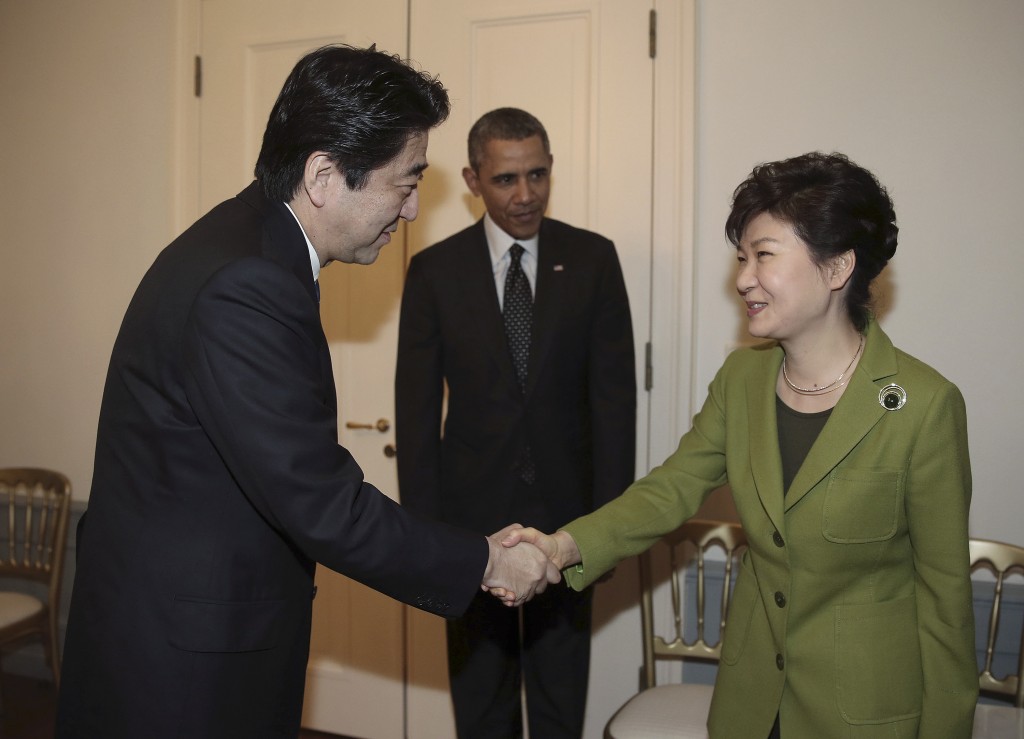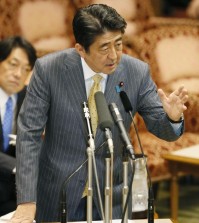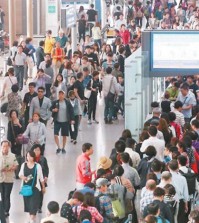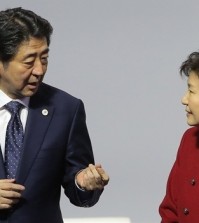- California Assembly OKs highest minimum wage in nation
- S. Korea unveils first graphic cigarette warnings
- US joins with South Korea, Japan in bid to deter North Korea
- LPGA golfer Chun In-gee finally back in action
- S. Korea won’t be top seed in final World Cup qualification round
- US men’s soccer misses 2nd straight Olympics
- US back on track in qualifying with 4-0 win over Guatemala
- High-intensity workout injuries spawn cottage industry
- CDC expands range of Zika mosquitoes into parts of Northeast
- Who knew? ‘The Walking Dead’ is helping families connect
Abe’s charm fails to win over Park

South Korean President Park Geun-hye, right, shakes hands with Japanese Prime Minister Shinzo Abe, left, as US President Barack Obama looks on before their trilateral meeting at the US Ambassador’s Residence in the Hague, Netherlands, Tuesday, March 25, 2014. (AP Photo/Yonhap, Do Kwang-hwan)
By Kim Tae-gyu
THE HAGUE ― Japanese Prime Minister Shinzo Abe’s charm offensive obviously failed to win over President Park Geun-hye.
In a trilateral summit, mediated by U.S. President Barack Obama, the two met for the first time as heads of state.
Abe tried to greet Park in Korean but this was received coldly.
Park has warned Abe on his nationalistic misbehavior but he didn’t heed this with a series of provocative acts.
Her aides, however, tried to downplay the discord that is by some accounts turning personal from Park’s perspective, saying that the summit achieved its intended goal of confirming a united front on North Korea. The unwritten goal was saving Obama’s face since without his intervention, Park would not have attended.
Experts do not predict any bilateral summit between the two anytime soon.
“Thorny issues were not discussed at all. They just talked about North Korea’s nuclear threats, one of the few areas where Seoul and Tokyo do not disagree,” said Paik Hak-soon at the Sejong Institute in Seoul.
“I don’t think that the one-off trilateral summit will play a big role in normalizing relations between the two estranged neighbors.”
Lee Kang-yun concurred that the 40-minute talks were nothing more than an event in which Park reluctantly took part due to pressure from Washington.
Koreans’ antagonism to Abe, who was found to be less popular than North Korean dictator Kim Jong-un in a recent survey in Korea, increased following his controversial visit late last year to the Yasukuni Shrine, which houses the remains of 14 Class-A war criminals, further straining already-frayed bilateral ties.
Earlier this month, Abe showed some signs of change by promising to honor two statements made by his predecessors in 1993 and 1995 that offered contrition for past misdeeds.
However, Park is seemingly not ready to embrace her controversial Japanese counterpart after the trilateral summit, the fifth one in history, where she half-heartedly participated.
During the 40-minute talks, she hardly made eye contact with Abe and maintained a grim face when he made remarks.
Meanwhile, Abe who had repeatedly asked for a summit with Park after he returned to power in late 2012 demonstrated his strong hope to improve ties with Seoul.












![일본 사도광산 [서경덕 교수 제공. 재판매 및 DB 금지]](http://www.koreatimesus.com/wp-content/uploads/2024/07/PYH2024072610800050400_P4-copy-120x134.jpg)


